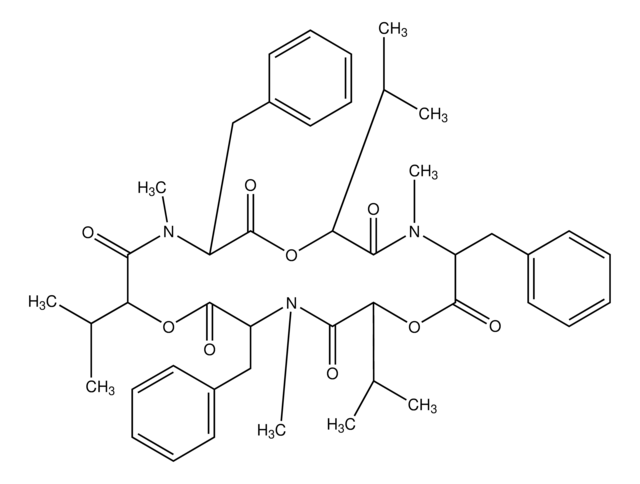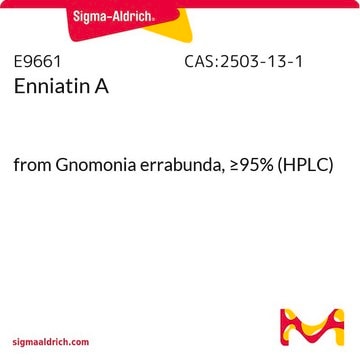D4921
Destruxin A from Metarrhizium anisopliae
≥98% (HPLC)
About This Item
Recommended Products
biological source
Metarrhizium anisopliae
Quality Level
Assay
≥98% (HPLC)
form
powder
storage temp.
−20°C
SMILES string
CC[C@H](C)[C@@H]1NC(=O)[C@H]2CCCN2C(=O)[C@H](CC=C)OC(=O)CCNC(=O)[C@H](C)N(C)C(=O)[C@H](C(C)C)N(C)C1=O
InChI
1S/C29H47N5O7/c1-9-12-21-27(38)34-16-11-13-20(34)26(37)31-23(18(5)10-2)28(39)33(8)24(17(3)4)29(40)32(7)19(6)25(36)30-15-14-22(35)41-21/h9,17-21,23-24H,1,10-16H2,2-8H3,(H,30,36)(H,31,37)/t18-,19-,20+,21-,23-,24-/m0/s1
InChI key
XIYSEKITPHTMJT-UTJJDKHZSA-N
Application
Biochem/physiol Actions
Quality
Signal Word
Warning
Hazard Statements
Precautionary Statements
Hazard Classifications
Acute Tox. 4 Dermal - Acute Tox. 4 Inhalation - Acute Tox. 4 Oral - Eye Irrit. 2 - Skin Irrit. 2 - STOT SE 3
Target Organs
Respiratory system
Storage Class Code
11 - Combustible Solids
WGK
WGK 3
Flash Point(F)
Not applicable
Flash Point(C)
Not applicable
Personal Protective Equipment
Certificates of Analysis (COA)
Search for Certificates of Analysis (COA) by entering the products Lot/Batch Number. Lot and Batch Numbers can be found on a product’s label following the words ‘Lot’ or ‘Batch’.
Already Own This Product?
Find documentation for the products that you have recently purchased in the Document Library.
Our team of scientists has experience in all areas of research including Life Science, Material Science, Chemical Synthesis, Chromatography, Analytical and many others.
Contact Technical Service








